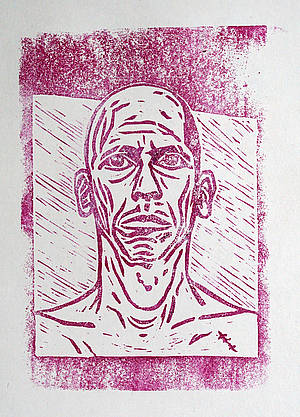Chemotherapy
The exhibition poster shows a face, half of which looks male and photographic while the other half looks female and resembles a comic. This symbolises the fluid relationship between body, gender and identity. You can find the background to the poster here, told by the person it depicts:
Chemotherapy
I like riding racing bikes: shorter distances at the beginning of the season, then I ramp it up. This year I don’t get any better; I give up and turn back. Shortly afterwards, I go to my GP for a blood test. Things start happening very quickly: a few hours later, my GP informs me that my results are off the charts; 15 minutes later, I’m picked up by ambulance and admitted to oncology for leukaemia. The bone marrow biopsy is done the next day; a few days later, a tube is permanently implanted under my collarbone and the first chemotherapy session starts.
This first-line treatment has a drastic impact on my body. Within a few days, my blood count starts reducing until there are no white blood cells left. My body is defenceless; infections are now life-threatening.
For as long as I can, I go for walks around the hospital grounds. Soon that will change; then I’ll stay in my room and for a long time I won’t even leave my bed. You quickly notice the effect of having a reduced number of red blood cells: I test out how many steps I can manage in the stairwell. I’ve swapped my racing bike for a couple of steps. I get weaker and more tired, stay in bed and don’t even want to read or watch TV. The light is dimmed. My horizon is the ceiling; time loses dimension.
Red blood corpuscles and blood platelets have to be transfused to avoid becoming critical. During the first infusion, a range of thoughts go through my mind. It’s odd to watch a stranger’s blood drip into you. I take a photo. A large number of transfusions will follow over the course of my treatment, so many I stopped counting them. I notice the change quite quickly: I’m no longer short of breath or dizzy, there are fewer contusions and my gums bleed less.
Blood is drawn every day. I monitor the results: I have zero immune cells. Medications protect me from bacterial and fungal infections; I wash in antiseptic, am fed a special low-bacteria diet, am given a single room. All hygiene rules are to be adhered to the letter and visits are drastically reduced. I am now my own enemy; bacteria that I had happily been able to live with before – on my skin or in my intestines – are now causing problems. The inflammatory markers rise and rise. The fungal infection in my lung bothers me most; it will stay with me for a long time yet. I have had a high fever for two weeks; my bed is drenched in sweat several times a day. The implanted access to my bloodstream is colonised by bacteria and has to be surgically removed. The infections combined with the high fever weaken me and wear me out.
There are lots of short hairs on my pillow: my beard hairs are breaking off. I have lost a lot of weight; I have dark circles under my eyes and sunken cheeks. I go to the mirror and look for the happy, sun-kissed face from last summer, but an ill body stares back at me.
My bone marrow starts producing its own cells again; hesitantly at first, but then the number grows rapidly. My body can defend itself again and joins in the battle against the bacteria. It works fantastically and within a few days the inflammatory markers start falling. Seven weeks have passed; I can stand up again, walk again and at the weekend I am allowed to go home for a few days.
Soon I will find out whether the leukaemia cells have been reduced enough and what the rest of the treatment will be like.
Leukaemia patient, 48 years old
First-line treatment
Vienna, 2020

